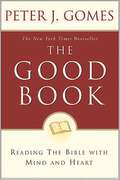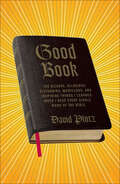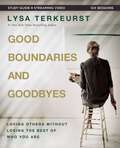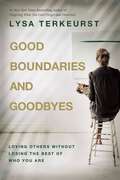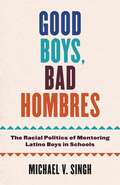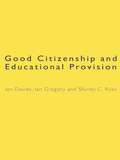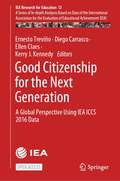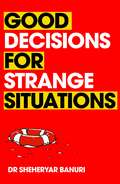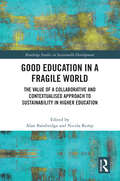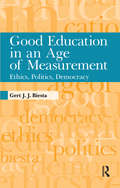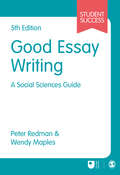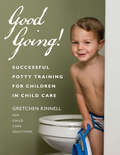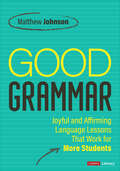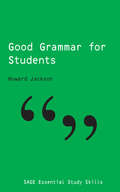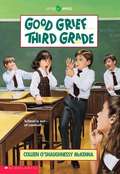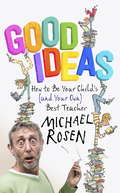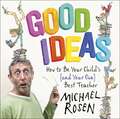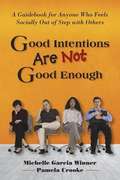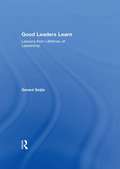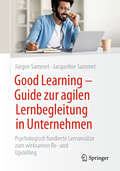- Table View
- List View
Good Book: Reading the Bible with Mind and Heart
by Peter J. Gomes"The Bible and the social and moral consequences that derive from its interpretation are all too important to be left in the hands of the pious or the experts, and too significant to be ignored and trivialized by the uninformed and indifferent.
Good Book: The Bizarre, Hilarious, Disturbing, Marvelous, and Inspiring Things I Learned When I Read Every Single Word of the Bible
by David Plotz“Hilarious . . . It’s CliffsNotes for Scripture—screenplay by Plotz, story by God . . . In the end, though, the book is made by the spirit of the writer.” —The New York Times Book ReviewAt a time when wars are fought over scriptural interpretation, when the influence of religion on American politics has never been greater, when many Americans still believe in the Bible’s literal truth, it has never been more important to get to know the Bible. Good Book is what happens when a regular guy—an average Job—actually reads the book on which his religion, his culture, and his world are based. Along the way, he grapples with the most profound theological questions: How many commandments do we actually need? Does God prefer obedience or good deeds? And the most unexpected ones: Why are so many women in the Bible prostitutes? Why does God love bald men so much? Is Samson really that stupid?“Like the Bible itself, Good Book contains multitudes—it is by turns thought-provoking, funny, enlightening and moving.” —A. J. Jacobs, New York Times–bestselling author of The Year of Living BiblicallyIrreverent . . . Plotz’s hilarious exegeses will have you laughing out loud. Who knew the Bible was such a riot?” —Time Out New York“Plotz is a genius writer.” —Franklin Foer, author of How Soccer Explains the World“A bloody good book . . . Very funny . . . Priceless for those of all traditions who see value in posing unanswerable questions to each other, and to God himself.” —Minneapolis Star Tribune“Deeply religious people might be offended by the book, but for the rest of us there’s a laugh on every page.” —Booklist
Good Boundaries and Goodbyes Bible Study Guide plus Streaming Video: Loving Others Without Losing the Best of Who You Are
by Lysa TerKeurstLove should draw us together, not tear us apart.Is it unloving or selfish to set a boundary? And what does the Bible instruct us to do when a relationship is no longer safe or sustainable? Lysa TerKeurst has asked these hard questions in the midst of her own relational struggles.But after thousands of hours of counseling intensives and theological research, Lysa has discovered that good boundaries pave the road for the truest version of love to emerge within the relationships that make up so much of who we are and what we want the most.Building upon and further unpacking the scriptural concepts in Good Boundaries and Goodbyes, this six-session video Bible study (streaming code included) with Lysa will equip you to:Determine the appropriate amount of personal and emotional access someone has to you.Stop being misled and emotionally paralyzed by wrongly interpreted or weaponized Scriptures.Overcome the frustrating cycle of ineffective boundary-setting with biblical principles and practical strategies to help you communicate, keep, and implement healthier patterns.Be equipped to say goodbye when a relationship has shifted from difficult to destructive by studying three types of goodbyes found in God&’s Word.Receive therapeutic and theological wisdom you can trust directly from Lysa&’s Christian counselor, Jim Cress, and Proverbs 31 Ministries&’ Director of Theology, Dr. Joel Muddamalle. This study guide has everything you need for a full Bible study experience, including:The study guide itself—with a comprehensive structure for group discussion time, video notes, and a leader's guide.An individual access code to stream all six video sessions online. (DVD also available separately.) Sessions and video run times:Boundaries Aren&’t Just a Good Idea, They&’re a God Idea (22:00)A Relationship Can Only Be as Healthy as the People in It (28:00)Maybe We&’ve Been Looking at Walls All Wrong (20:30)Old Patterns, New Practices (21:30)People in the Bible Who Had to Say Hard Goodbyes (30:30)You&’re Going to Make It (26:00) Streaming video access code included. Access code subject to expiration after 12/31/2027. Code may be redeemed only by the recipient of this package. Code may not be transferred or sold separately from this package. Internet connection required. Void where prohibited, taxed, or restricted by law. Additional offer details inside.
Good Boundaries and Goodbyes: Loving Others Without Losing the Best of Who You Are
by Lysa TerKeurstRelationships are wonderful . . . until they're not.Join #1 New York Times bestselling author Lysa TerKeurst as she helps you stop the dysfunction of unhealthy relationships by showing you biblical ways to set boundaries--and, when necessary, say goodbye--without losing the best of who you are.Is it unloving or selfish to set a boundary? Are Christians ever called to walk away from a relationship that&’s no longer safe or sustainable? Lysa TerKeurst deeply understands these hard questions in the midst of relational struggles.But after thousands of hours of counseling intensives and extensive theological research that transformed the way she defined healthy relationships, Lysa is now more committed than ever to loving people well without losing the best of who she is. She wants to help you do the same. In these pages Lysa will help you:Understand the five factors to remember when implementing healthy boundaries.Determine the appropriate amount of personal and emotional access someone has to you based on how responsible they'll be with that access.Stop being misled and emotionally paralyzed by wrongly interpreted or weaponized scriptures that perpetuate unhealthy dynamics in difficult relationships.Overcome the frustrating cycle of ineffective boundary-setting with realistic scripts and practical strategies to help you communicate, keep, and implement healthier patterns.Be equipped to say goodbye without guilt when a relationship has shifted from difficult to destructive and is no longer sustainable.Receive therapeutic wisdom you can trust directly from Lysa&’s Christian counselor Jim Cress, who weighs in throughout the book. You'll be relieved to learn that boundaries aren't just a good idea, they're a God idea.
Good Boys, Bad Hombres: The Racial Politics of Mentoring Latino Boys in Schools
by Michael V SinghThe unintended consequences of youth empowerment programs for Latino boys Educational research has long documented the politics of punishment for boys and young men of color in schools—but what about the politics of empowerment and inclusion? In Good Boys, Bad Hombres, Michael V. Singh focuses on this aspect of youth control in schools, asking on whose terms a positive Latino manhood gets to be envisioned. Based on two years of ethnographic research in an urban school district in California, Good Boys, Bad Hombres examines Latino Male Success, a school-based mentorship program for Latino boys. Instead of attempting to shape these boys&’ lives through the threat of punishment, the program aims to provide an &“invitation to a respectable and productive masculinity&” framed as being rooted in traditional Latinx signifiers of manhood. Singh argues, however, that the promotion of this aspirational form of Latino masculinity is rooted in neoliberal multiculturalism, heteropatriarchy, and anti-Blackness, and that even such empowerment programs can unintentionally reproduce attitudes that paint Latino boys as problematic and in need of control and containment. An insightful gender analysis, Good Boys, Bad Hombres sheds light on how mentorship is a reaction to the alleged crisis of Latino boys and is governed by the perceived remedies of the neoliberal state. Documenting the ways Latino men and boys resist the politics of neoliberal empowerment for new visions of justice, Singh works to deconstruct male empowerment, arguing that new narratives and practices—beyond patriarchal redemption—are necessary for a reimagining of Latino manhood in schools and beyond.
Good Broth to Warm Our Bones
by Hugh StevenIn the desolate Arctic tundra of Alaska's North Slope, the wind chill factor can plunge 100 degrees below zero. One small miscalculation, one seemingly insignificant oversight, can mean death by freezing. Thus, when the hardy lnupiat Eskimos of this region stop on the trail to pass around a cup of warm broth heated on a Primus stove, it is more than just shared nourishment. It is a symbol of their complete dependence on one another for survival. Into this close-knit culture on the edge of the world came Don Webster. Don was a taanak (outsider) with the burden of bringing the Inupiat people a different kind of "broth"--the New Testament in their native tongue. Could he survive the bitter nine-month Winter? Would he ever be accepted by these remarkable people who had learned to wrest a living from perhaps the most desolate place on earth? Here is the thrilling story of how Don Webster, with the help of the legendary Roy Ahmaogak, was able to overcome seemingly impossible hardships--to bring the life-giving broth of God's Word to warm the hearts of these Alaska Eskimos.
Good Citizenship and Educational Provision
by Shirley Riley Ian Davies Ian GregoryCitizenship has been taught in school around the world for many years now, and is due to be introduced to the UK curriculum over the next few years. Teachers, Headteachres, administrators and policy makers have the opportunity to develop citizenship education programs for all their students. This book takes a pragmatic approach to the issue, and answers many of the crucial questions that will be emerging: what definitions of citizenship are to be followed, and how is citizenship taught? What approaches will be taken by teachers and what is the likely shape of best practice for citizenship education? How will the issue impact on schools and teacher training, and how should they rise to the challenge? What are the key factors influencing or threatening the development of good citizens? Based on the analysis of data collected form over 700 teachers the book provides real solutions to questions raised by citizenship education, and makes recommendations for practice in schools and in the training and development of teachers.
Good Citizenship for the Next Generation: A Global Perspective Using IEA ICCS 2016 Data (IEA Research for Education #12)
by Kerry J. Kennedy Ernesto Treviño Diego Carrasco Ellen ClaesThis Open Access book presents an international group of scholars seeking to understand how youth from different cultures relate to modern multidimensional concepts of citizenship, and the roles that education and society have in shaping the views of the world’s future citizens. The book also explores how different aspects of citizenship, such as attitudes towards diverse population groups and concerns for social issues, relate to classical definitions of norm-based citizenship from the political sciences. Authors from Asia, Europe, and Latin America provide a series of in-depth investigations into how concepts of “good citizenship” are shaped in different regions of the globe, using the rich comparative data from the IEA’s International Civic and Citizenship Study (ICCS) 2016. In twelve chapters, the authors review the concept of “good citizenship”; how citizenship norms adherence is configured into profiles across countries; and what country, school, and background factors are related to how students adhere to citizenship norms. Recognizing contingent social and political situations in specific regions of the world, the present books offer six chapters where authors apply their expertise to offer locally relevant and pertinent observations on how young people from diverse cultures understand and relate to different dimensions of citizenship in countries of Asia, Europe, and Latin America. The present book is of relevance for different audiences interested in civic education and political socialization, including social sciences and education, integrating topics from political science, sociology, political psychology, and law.
Good Decisions for Strange Situations: A guide to making the right choices in the Corona pandemic and beyond
by Dr Sheheryar BanuriGood decisions are hard to make - agreed? Whether it's deciding what kind of take-away to order, what brand of shampoo to buy, or what to do in a crisis, we've all been in situations where we panic or overthink.And now, more than ever, we are in unfamiliar territory. Our routines and norms have been completely disrupted, replaced by stress and anxiety and making a good decision is harder than ever.But this book is here to help. Behavioural Economist Dr Sheheryar Banuri will be your guide. By asking: What can we learn from past behaviour in similar crises? How does the psychology of decision-making change under stress? And how can we avoid making the wrong decisions? Good Decisions for Strange Situations is that fool-proof guide to help you give yourself the best possible chance of choosing wisely.
Good Decisions for Strange Situations: A guide to making the right choices in the Corona pandemic and beyond
by Sheheryar BanuriGood decisions are hard to make - agreed? Whether it's deciding what kind of take-away to order, what brand of shampoo to buy, or what to do in a crisis, we've all been in situations where we panic or overthink.And now, more than ever, we are in unfamiliar territory. Our routines and norms have been completely disrupted, replaced by stress and anxiety and making a good decision is harder than ever.But this book is here to help. Behavioural Economist Dr Sheheryar Banuri will be your guide. By asking: What can we learn from past behaviour in similar crises? How does the psychology of decision-making change under stress? And how can we avoid making the wrong decisions? Good Decisions for Strange Situations is that fool-proof guide to help you give yourself the best possible chance of choosing wisely.
Good Education in a Fragile World: The Value of a Collaborative and Contextualised Approach to Sustainability in Higher Education (Routledge Studies in Sustainable Development)
by Alan Bainbridge Nicola KempThis edited collection aims to provoke discussion around the most important question for contemporary higher education – what kind of education (in terms of purpose, pedagogy and policy) is needed to restore the health and wellbeing of the planet and ourselves now and for generations to come? The book contains contributions from colleagues at a single UK University, internationally recognised for its approach to sustainability education. Introducing a conceptual framework called the ‘Paradox Model’, the book explores the tensions that underpin the challenge of developing sustainability in higher education in the 21st century. It asks probing questions about the purpose of higher education in the 21st century given growing concerns in relation to planetary safety and justice and calls for a rethinking of educational purpose. It draws upon the theory and practice of education and explores how these can develop an understanding of sustainability pedagogies in practice. Finally, it delivers thought-provoking discussion on what constitutes a ‘good’ higher education that meets the needs of a world in crisis. Drawing on a planetary health lens, the book concludes with a ‘manifesto’ that brings together the key insights from the contributing authors. This will be an engaging volume for academics and educators from a wide range of disciplines in higher educational settings interested in translating sustainability theory into educational practice.
Good Education in an Age of Measurement: Ethics, Politics, Democracy (Interventions: Education, Philosophy, And Culture Ser.)
by Gert J. BiestaThe widespread use of the measurement of educational outcomes in order to compare the performance of education within and across countries seems to express a real concern for the quality of education. This book argues that the focus on the measurement of educational outcomes has actually displaced questions about educational purpose. Biesta explores why the question as to what constitutes good education has become so much more difficult to ask and shows why this has been detrimental for the quality of education and for the level of democratic control over education. He provides concrete suggestions for engaging with the question of purpose in education in a new, more precise and more encompassing way, with explicit attention to the ethical, political and democratic dimensions of education.
Good Essay Writing: A Social Sciences Guide (Student Success)
by Peter Redman Wendy MaplesWriting good essays is one of the most challenging aspects of studying in the social sciences. This simple guide provides you with proven approaches and techniques to help turn you into a well-oiled, essay writing machine. Good Essay Writing demonstrates how to think critically and formulate your argument as well as offering water-tight structuring tips, referencing advice and a word on those all too familiar common worries – all brought to life through real student examples from a range of subjects. Now in its fifth edition, this fresh update contains: New essay examples are analysed and discussed, so you have a clear understanding of what makes a good essay A new chapter on essay writing skills and other forms of social science writing, helping you transfer the skills you learn to different types of written assessments A new Companion Website providing additional exercises and examples, helping you practice and apply the skills. This practical guide is an absolute must for everybody wanting – or needing – to brush up on their essay writing skills and boost their grades. The Student Success series are essential guides for students of all levels. From how to think critically and write great essays to planning your dream career, the Student Success series helps you study smarter and get the best from your time at university. Visit the SAGE Study Skills hub for tips and resources for study success!
Good Going!
by Gretchen Kinnell for the Child Care Council of Onondaga County, Inc.From the author of No Biting comes a comprehensive potty-training guide for child care teachers. Good Going! addresses the issues involved when young children are potty trained in a group setting, such as in the classroom, as well as in the home. Eight chapters offer a healthy perspective for developing consistent policies and successful practices for potty training, as well as guidelines for developing productive partnerships with parents--including sample parent communication tools and detailed resource lists.Gretchen Kinnell is the director of education and training at the Child Care Council in Syracuse, NY. She is also an adjunct instructor at Onondaga Community College and a regular contributor to Syracuse Newspaper's "Partners in Parenting" column.
Good Grammar [Grades 6-12]: Joyful and Affirming Language Lessons That Work for More Students (Corwin Literacy)
by Matthew JohnsonModernize grammar instruction with language lessons that inspire and engage students! Grammar and language instruction has long been, in the words of Brock Haussamen in Grammar Alive!, "the skunk at the garden party of the language arts" that turns many eager learners into disengaged participants. This type of disengagement, and resulting student struggles, have long been the norm, not the exception, when it comes to grammar and language lessons. But why? Why does grammar—something so relevant and essential that we use it in the creation of every syllable we say, write, or think—often end up as one of the dullest and most disconnected parts of the ELA classroom? Good Grammar: Joyful and Affirming Language Lessons That Work for More Students seeks to answer that question and to offer practical, on-the-ground solutions for making grammar and language instruction more accessible, practical, and connected to students’ reading, writing, and most importantly, the deep well of language knowledge they bring with them already. At the core of the book are six key practices for creating language instruction that comes across clearer, sticks better, transfers easier, and ultimately instills a love of language, all while teaching major grammatical concepts. Written by a practicing classroom teacher, this book offers Ready-to-go lessons and a recommended sequence Explanation of essential grammar and language concepts for teachers who need to refresh their own understanding of grammar and language topics and concepts Over a hundred modern, engaging, wide-ranging, and diverse mentor text examples Suggestions on how to introduce important linguistic concepts into secondary classes, including lessons about how language develops; how to define, examine, and celebrate dialects/familects/idiolects; and protocols for discussing concepts like code-meshing and "correctness" Examination of broader trends concerning what works and what doesn’t work in regards to grammar and language instruction, with a goal of giving teachers the tools they need to create their own grammar and language curriculum that engages, inspires, and transfers more easily into student writing and life beyond the classroom walls. The title—Good Grammar—seeks to remind us that grammar doesn’t have to be boring or feel punitive. Instead, it can be a force for good for more students, affirming who they are, honoring the language expertise they bring with them, and helping them to bring their unique voices to the page.
Good Grammar [Grades 6-12]: Joyful and Affirming Language Lessons That Work for More Students (Corwin Literacy)
by Matthew JohnsonModernize grammar instruction with language lessons that inspire and engage students! Grammar and language instruction has long been, in the words of Brock Haussamen in Grammar Alive!, "the skunk at the garden party of the language arts" that turns many eager learners into disengaged participants. This type of disengagement, and resulting student struggles, have long been the norm, not the exception, when it comes to grammar and language lessons. But why? Why does grammar—something so relevant and essential that we use it in the creation of every syllable we say, write, or think—often end up as one of the dullest and most disconnected parts of the ELA classroom? Good Grammar: Joyful and Affirming Language Lessons That Work for More Students seeks to answer that question and to offer practical, on-the-ground solutions for making grammar and language instruction more accessible, practical, and connected to students’ reading, writing, and most importantly, the deep well of language knowledge they bring with them already. At the core of the book are six key practices for creating language instruction that comes across clearer, sticks better, transfers easier, and ultimately instills a love of language, all while teaching major grammatical concepts. Written by a practicing classroom teacher, this book offers Ready-to-go lessons and a recommended sequence Explanation of essential grammar and language concepts for teachers who need to refresh their own understanding of grammar and language topics and concepts Over a hundred modern, engaging, wide-ranging, and diverse mentor text examples Suggestions on how to introduce important linguistic concepts into secondary classes, including lessons about how language develops; how to define, examine, and celebrate dialects/familects/idiolects; and protocols for discussing concepts like code-meshing and "correctness" Examination of broader trends concerning what works and what doesn’t work in regards to grammar and language instruction, with a goal of giving teachers the tools they need to create their own grammar and language curriculum that engages, inspires, and transfers more easily into student writing and life beyond the classroom walls. The title—Good Grammar—seeks to remind us that grammar doesn’t have to be boring or feel punitive. Instead, it can be a force for good for more students, affirming who they are, honoring the language expertise they bring with them, and helping them to bring their unique voices to the page.
Good Grammar for Students (SAGE Essential Study Skills Series)
by Howard JacksonMany students set out in further and higher education with little grounding in the skills required for academic writing. This practical guide will give students a command of grammar, spelling and punctuation, enabling them to improve the quality and accuracy of their writing. The book includes: - the basics of English grammar - how sentences are structured; - help with spelling and punctuation; - tips on avoiding the most common mistakes and pitfalls; - advice on how students can improve their writing in essays, reports and projects. The book is packed with examples to illustrate points and highlight good and bad practice, and contains handy tips and student exercises. An indispensable companion for undergraduate students on any Social Science, Humanities or Arts degree course, Good Grammar for Students is also an ideal text for Study Skills modules at first year undergraduate level across the social sciences. SAGE Study Skills are essential study guides for students of all levels. From how to write great essays and succeeding at university, to writing your undergraduate dissertation and doing postgraduate research, SAGE Study Skills help you get the best from your time at university.
Good Grief... Third Grade
by Colleen O'Shaughnessy MckennaMarsha Cessano, Collette Murphy's neighbor, is determined to be good in third grade -- no messy desk, no temper, and no tricks -- but Roger Friday is making it difficult.
Good Ideas: How to Be Your Child's (and Your Own) Best Teacher
by Michael RosenWe live in a world surrounded by all the stuff that education is supposed to be about: machines, bodies, languages, cities, votes, mountains, energy, movement, plays, food, liquids, collisions, protests, stones, windows. But the way we've been taught often excludes all sorts of practical ways of finding out about ideas, knowledge and culture - anything from cooking to fixing loo cisterns, from dance to model making, from collecting leaves to playing 'Who am I?'. The great thing is that you really can use everything around you to learn more.Learning should be much more fun and former children's laureate, million-selling author, broadcaster, father of five and all-round national treasure, Michael Rosen wants to show you how. Forget lists, passing tests and ticking boxes, the world outside the classroom can't be contained within the limits of any kind of curriculum - and it's all the better for it. Long car journeys, poems about farting, cake baking, even shouting at the TV can teach lessons that will last a lifetime. Packed with enough practical tips, stories and games to inspire a legion of anxious parents and bored children, Good Ideas shows that the best kind of education really does start at home.
Good Ideas: How to Be Your Child's (and Your Own) Best Teacher
by Michael RosenWe live in a world surrounded by all the stuff that education is supposed to be about: machines, bodies, languages, cities, votes, mountains, energy, movement, plays, food, liquids, collisions, protests, stones, windows. But the way we've been taught often excludes all sorts of practical ways of finding out about ideas, knowledge and culture - anything from cooking to fixing loo cisterns, from dance to model making, from collecting leaves to playing 'Who am I?'. The great thing is that you really can use everything around you to learn more.Learning should be much more fun and former children's laureate, million-selling author, broadcaster, father of five and all-round national treasure, Michael Rosen wants to show you how. Forget lists, passing tests and ticking boxes, the world outside the classroom can't be contained within the limits of any kind of curriculum - and it's all the better for it. Long car journeys, poems about farting, cake baking, even shouting at the TV can teach lessons that will last a lifetime. Packed with enough practical tips, stories and games to inspire a legion of anxious parents and bored children, Good Ideas shows that the best kind of education really does start at home.
Good Ideas: How to Be Your Child's (and Your Own) Best Teacher
by Michael RosenWe live in a world surrounded by all the stuff that education is supposed to be about: machines, bodies, languages, cities, votes, mountains, energy, movement, plays, food, liquids, collisions, protests, stones, windows. But the way we've been taught often excludes all sorts of practical ways of finding out about ideas, knowledge and culture - anything from cooking to fixing loo cisterns, from dance to model making, from collecting leaves to playing 'Who am I?'. The great thing is that you really can use everything around you to learn more.Learning should be much more fun and former children's laureate, million-selling author, broadcaster, father of five and all-round national treasure, Michael Rosen wants to show you how. Forget lists, passing tests and ticking boxes, the world outside the classroom can't be contained within the limits of any kind of curriculum - and it's all the better for it. Long car journeys, poems about farting, cake baking, even shouting at the TV can teach lessons that will last a lifetime. Packed with enough practical tips, stories and games to inspire a legion of anxious parents and bored children, Good Ideas shows that the best kind of education really does start at home.(P)2014 John Murray Press
Good Intentions Are Not Good Enough
by Michelle Garcia Winner Pamela CrookeBook geared to young adults and adults on why Social Thinking/social skills are important in the workplace, community, and in relationships.
Good Leaders Learn: Lessons from Lifetimes of Leadership
by Gerard SeijtsHow do leaders learn to lead? How do leaders set themselves up for success? This book explores the real-life experiences of a wide variety of leaders from different industries, sectors, and countries to bring to light new lessons on the importance of life-long learning. Consisting primarily of a series of probing interviews, Good Leaders Learn presents the challenges, triumphs, and reflections of 31 senior and high-profile leaders, offering insight into how they learned to lead during their careers. The book pulls important and useful perspectives into a robust theoretical framework that includes the importance of innate curiosity, challenging oneself, risk-taking, and other key elements of good leadership. With practical insights complemented by the latest leadership research and theory, this book will help current and potential leaders to build a solid foundation of the leadership qualities vital to their continuing success.
Good Learning - Guide zur agilen Lernbegleitung in Unternehmen: Psychologisch fundierte Lernansätze zum wirksamen Re- und Upskilling
by Jürgen Sammet Jacqueline SammetGood Learning - kontinuierliches Lernen und gezielte Kompetenzentwicklung - mit agiler Lernbegleitung zu wirksamem Re- und UpskillingDurch konsequente Fort- und Weiterbildung gelingt die Anpassung an die sich immer schneller wandelnden Anforderungen. Doch viele Lerntrends halten nicht, was sie versprechen und versanden wirkungslos.Fern von flüchtigen Moden vermittelt Ihnen dieses Buch bewährte, wissenschaftlich fundierte Lernansätze. Erfahren Sie, wie Sie mit dem Konzept der Agilen Lernbegleitung die drei entscheidenden E`s im betrieblichen Lernen umsetzen: Effektivität, Effizienz und Empowerment.Dieses Buch vermittelt Ihnen handfeste Anwendungsideen für eine zeitgemäße Learning Experience. Damit „Good Learning“ gelingt. Zielgruppen:HR-Verantwortliche, die innovative Lernstrategien implementieren möchten.Learning Professionals, die nachhaltige Lernkulturen schaffen wollen.Trainer:innen, die ihre Angebote an die moderne Lernlandschaft anpassen möchten.Führungskräfte, die die Entwicklung der Mitarbeitenden zielgerichtet unterstützen wollen.Teammitglieder, die für das Team-Lernen verantwortlich sind.Fachexpert:innen, die ihre Expertise weitergeben möchten.
Good Moon Rising
by Nancy GardenLambda Literary Award winner Good Moon Rising is about two young women who fall in love while rehearsing a school play, realize they're gay, and resist a homophobic campaign against them.
